Lasswell Harold D. The Political Writings of Harold D. Lasswell
Подождите немного. Документ загружается.

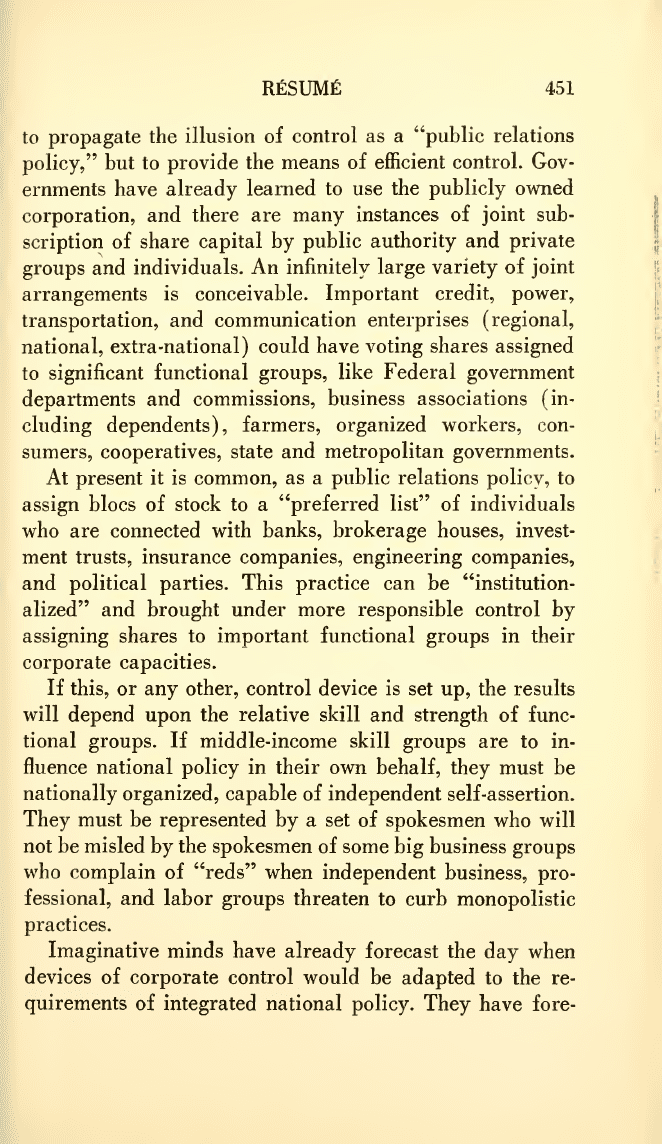
RfiSUMie
451
to
propagate
the
illusion of
control as
a
"public relations
policy," but
to
provide the means
of efficient
control.
Gov-
ernments have
already learned
to use the
publicly owned
corporation,
and
there are
many instances of
joint
sub-
scription of share
capital by
public authority and
private
groups and
individuals. An
infinitely large variety of joint
arrangements
is conceivable.
Important
credit, power,
transportation,
and communication
enterprises (regional,
national,
extra-national) could have
voting shares assigned
to
significant
functional groups,
like Federal government
departments
and commissions,
business associations (in-
cluding dependents),
farmers,
organized workers,
con-
sumers, cooperatives,
state and
metropolitan governments.
At present
it
is
common, as a public relations policy, to
assign blocs of stock to a
"preferred list" of individuals
who are connected with
banks, brokerage
houses, invest-
ment trusts, insurance companies, engineering companies,
and
political parties. This practice can
be
"institution-
alized" and brought under
more responsible
control by
assigning
shares to
important functional
groups in their
corporate
capacities.
If
this,
or
any
other,
control device is
set up,
the results
will
depend upon the
relative skill
and strength
of func-
tional groups.
If middle-income skill groups are
to in-
fluence national policy
in
their
own behalf,
they must be
nationally organized, capable
of independent
self-assertion.
They must
be
represented
by a set of spokesmen
who will
not be misled
by
the spokesmen
of some big
business groups
who
complain of "reds"
when independent
business, pro-
fessional,
and labor groups threaten
to
curb
monopolistic
practices.
Imaginative
minds have already
forecast the
day when
devices of corporate control
would
be adapted
to the
re-
quirements
of
integrated
national policy.
They
have
fore-
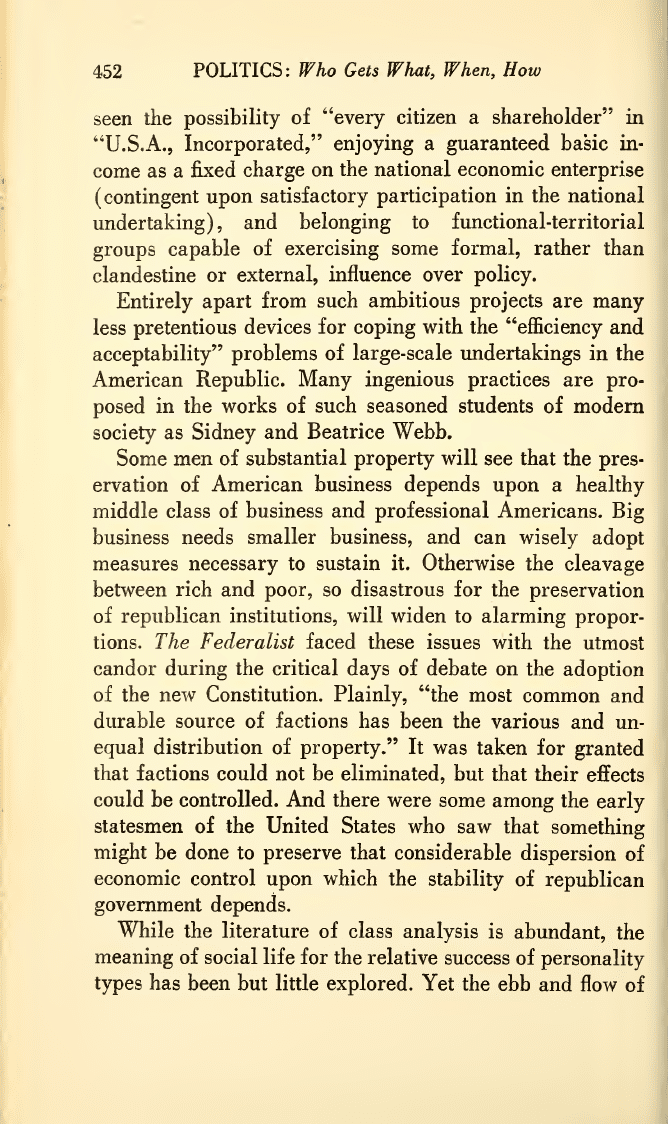
452
POLITICS:
Who Gets What,
When,
How
seen
the
possibility
of "every
citizen
a
shareholder"
in
"U.S.A.,
Incorporated,"
enjoying
a
guaranteed
basic in-
come as a
fixed
charge on
the national economic enterprise
(contingent
upon
satisfactory
participation in the national
undertaking),
and
belonging to functional-territorial
groups
capable
of
exercising some
formal,
rather than
clandestine
or external,
influence over policy.
Entirely
apart from
such ambitious projects are
many
less
pretentious
devices for coping with the "efl&ciency
and
acceptability"
problems of large-scale undertakings
in the
American
Republic. Many ingenious practices
are pro-
posed
in the
works of such seasoned students
of modem
society as Sidney
and
Beatrice
Webb.
Some men
of substantial
property
will
see
that
the pres-
ervation of
American business depends
upon a healthy
middle
class of business
and professional
Americans.
Big
business needs
smaller business, and
can wisely
adopt
measures necessary to
sustain
it. Otherwise the
cleavage
between rich
and poor,
so
disastrous
for the
preservation
of
republican institutions, will widen
to alarming
propor-
tions.
The Federalist faced
these issues with
the
utmost
candor
during the critical
days of debate on
the adoption
of the
new
Constitution. Plainly,
"the most
common
and
durable
source
of
factions
has been the
various
and
un-
equal distribution of
property."
It
was taken
for
granted
that
factions could not be eliminated,
but
that their
effects
could be controlled. And there were
some among
the
early
statesmen
of the United States
who saw that
something
might
be done to preserve that
considerable
dispersion
of
economic
control upon
which
the stability
of
republican
government depends.
While
the literature of class
analysis
is
abundant,
the
meaning of social
life for the
relative success
of
personality
types has
been but little explored. Yet
the
ebb and
flow
of
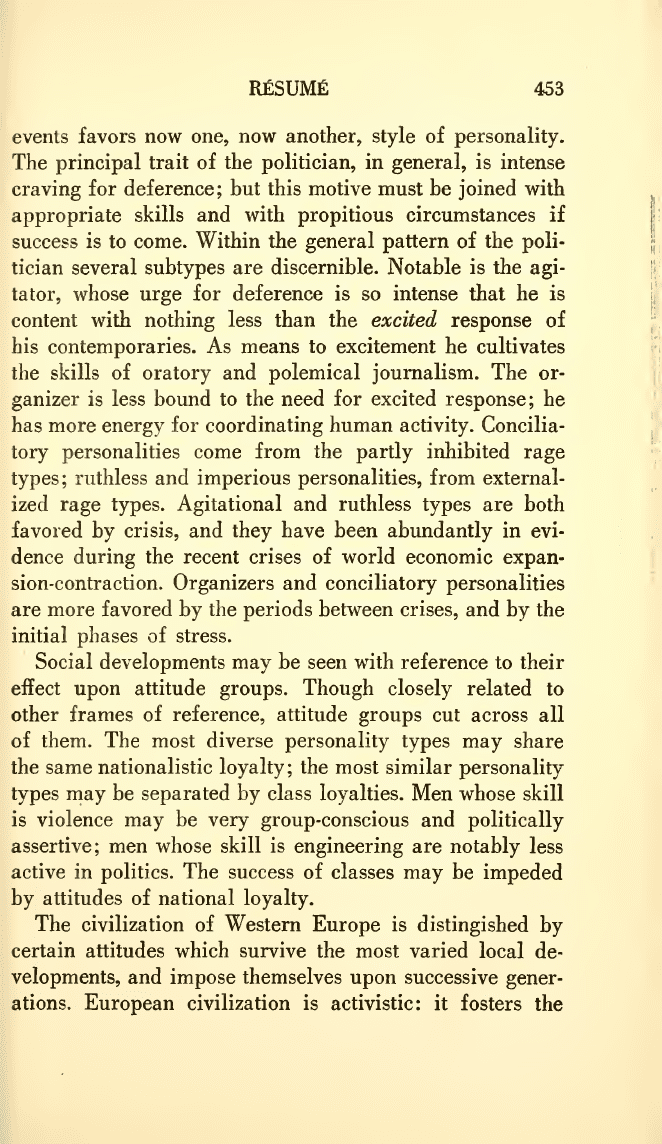
RfiSUMfi
453
events favors now
one, now another, style of personality.
The
principal
trait of the politician, in general, is intense
craving for
deference; but this motive must be joined with
appropriate
skills and with propitious circumstances if
success is to
come. Within the general pattern of the poli-
tician
several
subtypes are discernible. Notable is the agi-
tator, whose
urge for deference
is so
intense
that he
is
content with nothing
less than
the
excited
response of
his contemporaries. As means
to excitement
he cultivates
the skills of oratory and
polemical journalism.
The or-
ganizer is less bound to
the
need
for excited
response; he
has more energy
for coordinating human activity.
Concilia-
tory personalities come from
the partly
inhibited rage
types;
ruthless and imperious personalities, from external-
ized rage types.
Agitational
and
ruthless
types are
both
favored
by
crisis, and they have been abundantly
in evi-
dence during the recent crises of world economic
expan-
sion-contraction. Organizers and conciliatory
personalities
are
more favored by the periods between crises,
and by the
initial phases of stress.
Social developments may be
seen
with
reference to their
effect upon attitude groups. Though closely
related
to
other
frames of reference, attitude groups
cut across
all
of them. The most diverse personality types
may share
the same nationalistic loyalty; the most
similar personality
types may be separated by class loyalties.
Men whose skill
is violence may be
very
group-conscious
and politically
assertive; men whose skill is engineering
are notably
less
active in
politics. The success of classes may be
impeded
by
attitudes
of national loyalty.
The civilization
of
Western
Europe is distingished
by
certain attitudes which survive
the most varied
local
de-
velopments, and impose themselves upon
successive
gener-
ations.
European civilization is activistic:
it fosters
the
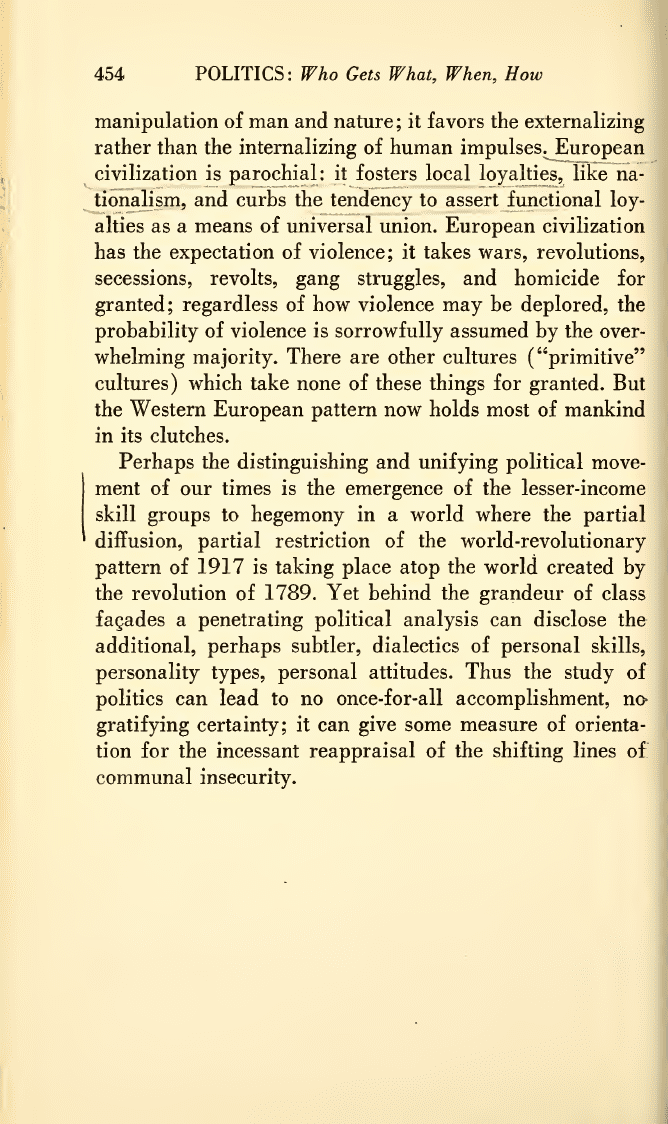
454 POLITICS: Who Gets What, When, How
manipulation
of man and nature ; it favors the externalizing
rather than the internalizing of human impulses.
European
civilization is parochial: it fosters
local
loyalties, like
na-
tionalism, and curbs the tendency to assert functional
loy-
alties
as a
means
of
universal
union. European civilization
has
the expectation of violence; it takes
wars,
revolutions,
secessions, revolts, gang struggles,
and homicide for
granted; regardless of how violence may
be
deplored,
the
probability of violence is sorrowfully assumed
by the over-
whelming majority. There are other cultures ("primitive"
cultures)
which
take none of these
things
for granted.
But
the Western European pattern now holds most
of mankind
in its clutches.
Perhaps the distinguishing and unifying political
move-
ment of our times is the emergence of the lesser-income
skill
groups to hegemony in a
world
where the partial
•
diffusion, partial restriction of the
world-revolutionary
pattern of 1917
is taking
place
atop the world
created
by
the revolution of
1789. Yet behind the grandeur
of class
fagades a
penetrating political analysis
can disclose the
additional, perhaps
subtler, dialectics of personal
skills,
personality types,
personal attitudes. Thus the
study of
politics can lead to no
once-for-all accomplishment,
no-
gratifying certainty; it can
give some measure of orienta-
tion for
the
incessant reappraisal of the shifting lines
of
communal insecurity.
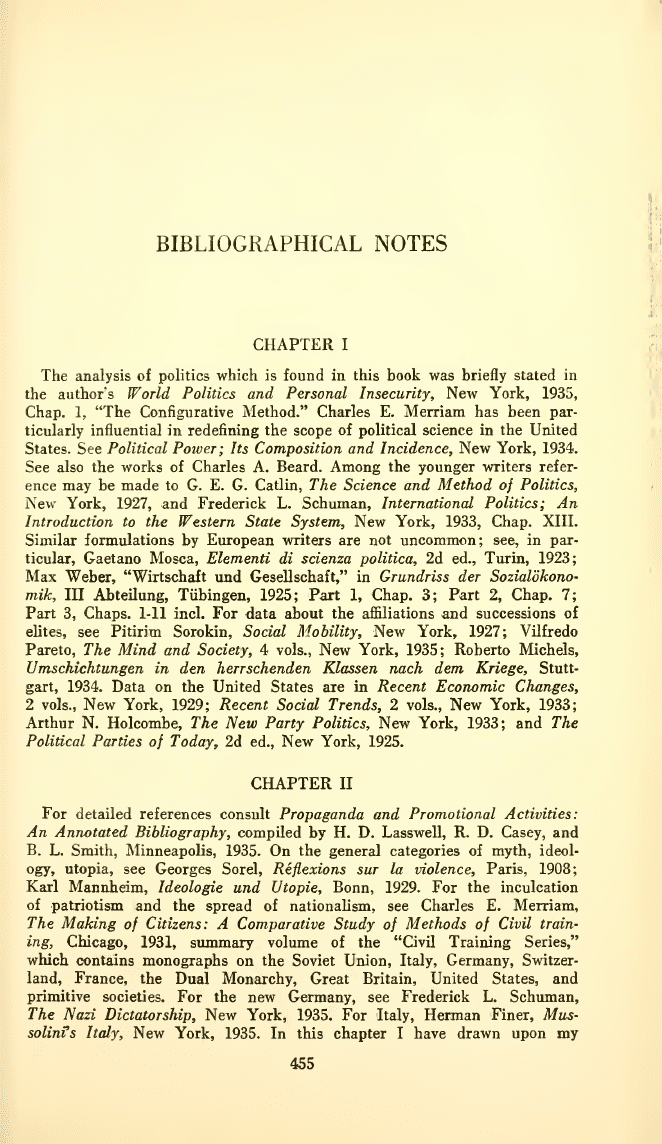
BIBLIOGRAPHICAL NOTES
CHAPTER
I
The
analysis of politics
which is
found
in this book was briefly
stated in
the authors
World Politics and Personal
Insecurity,
New
York,
1935,
Chap.
1,
"The
Configurative Method." Charles E.
Merriam
has been
par-
ticularly
influential in redefining the
scope
of
political science in the United
States.
See
Political Power;
Its
Composition
and
Incidence, New York, 1934.
See
also the works of Charles A.
Beard. Among the younger writers refer-
ence may be made to G. E.
G.
Catlin, The Science and Method
of
Politics,
New
York,
1927,
and Frederick L.
Schuman, International
Politics;
An
Introduction to the Western State System, New York,
1933,
Chap.
XIII.
Similar
formulations
by
European writers are not uncommon; see,
in par-
ticular, Gaetano
Mosca,
Elementi
di
scienza politico, 2d ed., Turin,
1923;
Max
Weber,
"Wirtschaft und Gesellschaft," in Grundriss der
Sozialokono-
mik,
in Abteilung, Tiibingen,
1925;
Piirt
1,
Chap.
3;
Part
2,
Chap.
7;
Part
3,
Chaps.
1-11
incl. For
data
about the
affiliations
and
successions
of
elites,
see
Pitirim Sorokin,
Social
Mobility, New
York, 1927;
Vilfredo
Pareto,
The Mind and
Society, 4 vols..
New York,
1935;
Roberto Michels,
Umschichtungen
in den herrschenden
Klassen
nach dem
Kriege, Stutt-
gart, 1934.
Data on the United States are
in Recent Economic Changes,
2 vols.. New York,
1929;
Recent Social Trends, 2 vols.. New York,
1933;
Arthur
N. Holcombe, The New Party Politics, New York,
1933;
and The
Political
Parties
of
Today,
2d
ed., New York, 1925.
CHAPTER II
For
detailed references consult
Propaganda and
Promotional Activities:
An Annotated
Bibliography, compiled
by
H. D. Lasswell, R.
D, Casey,
and
B.
L. Smith,
Minneapolis,
1935. On
the
general
categories of myth, ideol-
ogy, Utopia,
see Georges
Sorel, Reflexions sur
la violence, Paris,
1908;
Karl
Mannheim,
Ideologic und Utopie, Bonn, 1929. For
the
inculcation
of
patriotism
and the spread of nationalism, see Charles E.
Merriam,
The Making
of
Citizens:
A
Comparative Study
of
Methods
of
Civil
train-
ing,
Chicago,
1931,
simimary volume of
the "Civil Training
Series,"
which contains
monographs
on the
Soviet Union, Italy,
Germany, Switzer-
land, France,
the
Dual Monarchy, Great
Britain, United States, and
primitive
societies.
For the new
Germany, see
Frederick L. Schuman,
The Nazi
Dictatorship,
New York, 1935. For Italy, Herman
Finer, Mus-
solini^s
Italy,
New
York, 1935. In this chapter I have
drawn upon my
455
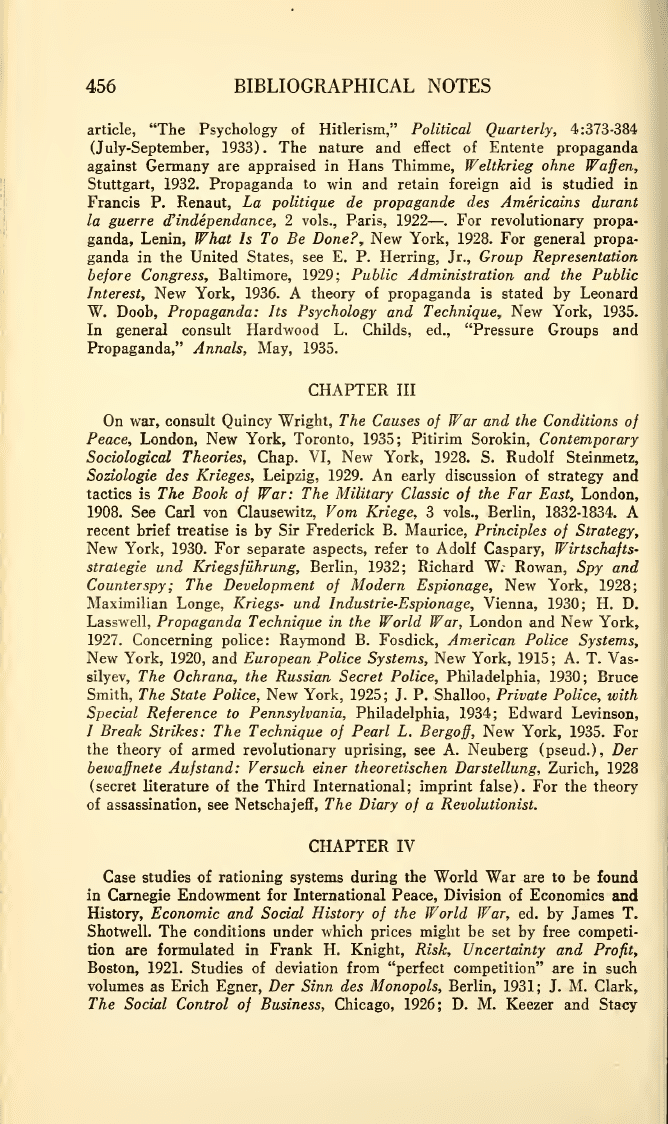
456
BIBLIOGRAPHICAL NOTES
article,
"The
Psychology of Hitlerism," Political
Quarterly, 4:373-384
(July-September,
1933),
The
nature
and
effect of Entente
propaganda
against Germany
are
appraised in Hans
Thimme, Weltkrieg ohne
JFaffen,
Stuttgart,
1932.
Propaganda
to
win
and
retain foreign aid is studied in
Francis
P.
Renaut, La
politique
de
propagande
des
Americains durant
la guerre
d'independance, 2 vols., Paris,
1922
—
. For revolutionary
propa-
ganda,
Lenin, W^hat Is To Be Done?, New York, 1928. For general propa-
ganda in the United
States,
see
E.
P. Herring, Jr., Group
Representation
before
Congress, Baltimore,
1929;
Public Administration and the Public
Interest, New York, 1936.
A
theory of propaganda is stated by Leonard
W. Doob, Propaganda:
Its Psychology
and
Technique,
New York, 1935.
In general consult
Hardwood L. Childs, ed., "Pressure
Groups
and
Propaganda," Annals, May, 1935.
CHAPTER III
On
war, consult Quincy
Wright,
The Causes
of
War and the Conditions
of
Peace,
London,
New York,
Toronto,
1935;
Pitirim
Sorokin, Contemporary
Sociological
Theories, Chap.
VI, New York,
1928.
S.
Rudolf Steinmetz,
Soziologie
des
Krieges, Leipzig, 1929.
An
early discussion
of
strategy
and
tactics is The Book
of
War: The
Military
Classic
of
the Far East,
London,
1908, See
Carl von Clausevritz,
Vom Kriege,
3 vols., Berlin, 1832-1834.
A
recent
brief
treatise
is
by
Sir Frederick B. Maurice,
Principles
of
Strategy,
New
York,
1930.
For separate aspects, refer to
Adolf Caspary,
Wirtschafts-
strategie und Kriegsfiihrung, Berlin,
1932;
Richard
W; Rowan,
Spy and
Counterspy;
The
Development
of
Modern Espionage, New
York,
1928;
Maximilian
Longe,
Kriegs- und Industrie-Espionage,
Vienna,
1930;
H, D.
Lasswell, Propaganda Technique
in the
World
War, London
and
New
York,
1927. Concerning police:
Raymond
B. Fosdick, American Police
Systems,
New York,
1920, and
European Police Systems, New York,
1915
; A. T, Vas-
silyev. The Ochrana, the Russian Secret Police, Philadelphia,
1930;
Bruce
Smith,
The
State Police,
New
York,
1925;
J.
P. Shalloo, Private Police,
with
Special
Reference
to Pennsylvania, Philadelphia,
1934;
Edward Levinson,
/
Break
Strikes: The Technique
of
Pearl L.
Bergoff,
New York, 1935. For
the theory
of armed revolutionary
uprising,
see
A.
Neuberg
(pseud.), Der
bewaffnete
Auf
stand: Versuch
einer
theoretischen Darstellung,
Zurich,
1928
(secret literature
of the
Third International; imprint
false). For the theory
of assassination,
see
Netschajeff, The Diary
of
a
Revolutionist.
CHAPTER IV
Case
studies of
rationing
systems during
the
World War
are
to
be found
in Carnegie Endowment for
International
Peace,
Division
of Economics
and
History, Economic and Social
History
of
the World War,
ed.
by James
T.
Shotwell.
The
conditions under
which prices
might
be
set
by free
competi-
tion
are
formulated in Frank H.
Knight, Risk, Uncertainty
and
Profit,
Boston,
1921. Studies of
deviation from "perfect competition" are
in such
volumes
as
Erich Egner, Der Sinn des Monopols, Berlin,
1931;
J.
M. Clark,
The Social
Control
of
Business, Chicago,
1926;
D. M, Keezer and Stacy
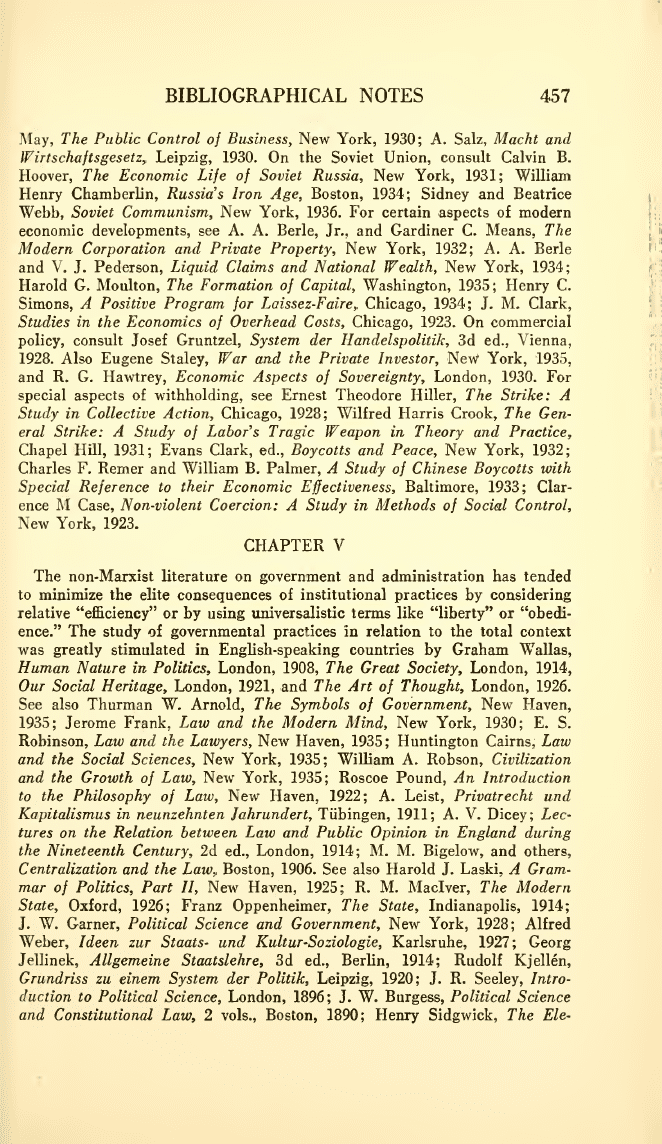
BIBLIOGRAPHICAL NOTES
457
May,
The Public
Control
of
Business,
New York,
1930; A.
Salz, Macht and
Wirtschaftsgesetz,
Leipzig,
1930.
On
the Soviet Union,
consult
Calvin B.
Hoover, The
Economic
Life
of
Soviet Russia,
New York, 1931; WiUiam
Henry
Chamberlin, Russia's Iron Age, Boston,
1934;
Sidney
and
Beatrice
"Webb,
Soviet Communism, New York,
1936.
For certain aspects
of modern
economic
developments, see A. A. Berle,
Jr., and
Gardiner
C.
Means, The
Modern
Corporation
and
Private Property,
New York,
1932;
A. A.
Berle
and
V.
J.
Pederson,
Liquid Claims
and
National Wealth,
New York,
1934;
Harold
G.
Moulton,
The Formation
of
Capital, Washington,
1935;
Henry
C.
Simons,
A Positive
Program
for
Laissez-Faire, Chicago,
1934;
J.
M. Clark,
Studies in the Economics
of
Overhead Costs, Chicago, 1923.
On
commercial
policy, consult
Josef
Gruntzel, System der
Handelspolitik,
3d
ed., Vienna,
1928. Also Eugene Staley, War and
the Private Investor,
New
York,
1935,
and R. G.
Hawtrey,
Economic
Aspects
of
Sovereignty, London,
1930. For
special aspects of
withholding,
see
Ernest Theodore Hiller,
The
Strike:
A
Study in Collective Action, Chicago,
1928;
Wilfred Harris Crook, The
Gen-
eral
Strike: A Study
of
Labor
s
Tragic Weapon in Theory and Practice,
Chapel Hill,
1931;
Evans
Clark, ed., Boycotts and Peace,
New
York,
1932;
Charles F. Remer
and
William B. Palmer, A Study
of
Chinese Boycotts
with
Special
Reference
to
their
Economic
Effectiveness,
Baltimore,
1933;
Clar-
ence
M
Case,
Non-violent Coercion: A Study
in
Methods
of
Social Control,
New York,
1923.
CHAPTER
V
The non-Marxist literature on government and administration has tended
to minimize the elite consequences of institutional practices
by
considering
relative "efficiency"
or by
using universalistic terms like "liberty" or "obedi-
ence." The study of governmental
practices
in
relation
to the total context
was greatly
stimulated in
English-speaking
countries by Graham Wallas,
Human Nature
in
Politics,
London,
1908,
The Great Society,
London,
1914,
Our Social Heritage,
London,
1921,
and
The Art
of
Thought,
London, 1926.
See also Thurman W. Arnold, The
Symbols
of
Government,
New Haven,
1935;
Jerome Frank,
Law
and the Modern
Mind,
New York,
1930;
E.
S.
Robinson,
Law
and
the
Lawyers, New
Haven,
1935
; Huntington Cairns, Law
and
the Social Sciences,
New
York,
1935;
WiUiam
A. Robson,
Civilization
and the Growth
of
Law, New York,
1935;
Roscoe
Pound,
An Introduction
to the Philosophy
of
Law, New Haven,
1922; A.
Leist, Privatrecht und
Kapitalismus
in neunzehnten Jahrundert, Tiibingen,
1911;
A. V. Dicey; Lec-
tures
on the
Relation between Law
and
Public Opinion
in
England
during
the Nineteenth Century, 2d
ed.,
London,
1914;
M.
M.
Bigelow,
and others.
Centralization
and the
Law,. Boston, 1906.
See
also Harold
J.
Laski,
A
Gram-
mar
of
Politics, Part
U,
New Haven,
1925;
R. M. Maclver, The Modern
State,
Oxford,
1926;
Franz Oppenheimer, The State, Indianapolis,
1914;
J.
W. Garner, Political Science
and
Government, New York,
1928;
Alfred
Weber, Ideen zur Staats- und
Kultur-Soziologie,
Karlsruhe,
1927;
Georg
Jellinek,
Allgemeine Staatslehre, 3d
ed.,
Berlin,
1914; Rudolf Kjellen,
Grundriss zu
einem
System
der
Politik, Leipzig,
1920;
J.
R. Seeley, Intro-
duction
to Political
Science, London,
1896;
J.
W.
Burgess,
Political
Science
and Constitutional
Law, 2 vols., Boston,
1890;
Henry Sidgwick, The
Ele-
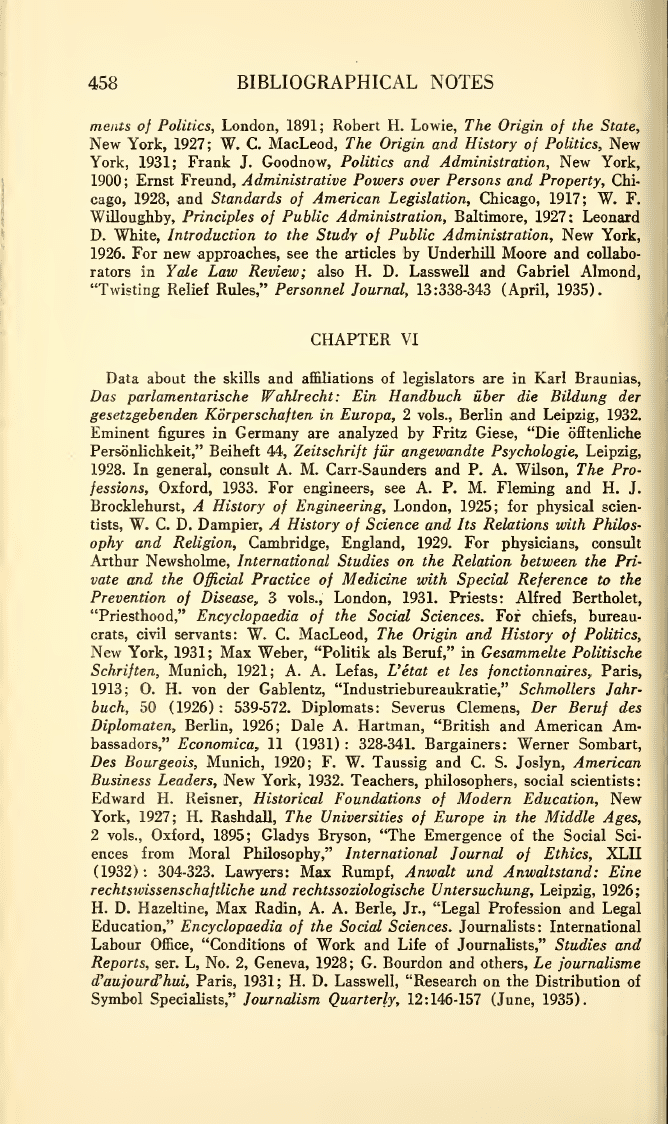
458
BIBLIOGRAPHICAL NOTES
meats
of
Politics, London,
1891;
Robert H. Lowie, The Origin
of
the
State,
New
York,
1927;
W. C.
MacLeod,
The Origin
and
History
of
Politics,
New
York,
1931;
Frank
J.
Goodnow, Politics
and
Administration,
New York,
1900
; Ernst
Freund,
Administrative
Powers over
Persons
and Property,
Chi-
cago, 1928,
and
Standards
of
American Legislation,
Chicago,
1917; W.
F.
WUIoughby,
Principles
of
Public
Administration,
Baltimore,
1927: Leonard
D. White,
Introduction to
the Study
of
Public Administration,
New
York,
1926. For
new approaches, see the
articles
by
UnderhUl Moore and collabo-
rators in Yale
Law Review; also
H. D.
Lasswell
and Gabriel Almond,
"Twisting Relief Rules,"
Personnel
Journal,
13:338-343
(April,
1935).
CHAPTER VI
Data about the skills
and
afi&liations of legislators are
in
Karl Braunias,
Das
parlamentarische Wahlrecht:
Ein
Handbuch
fiber die
Bildung
der
gesetzgebenden
Korperschaften in
Europa,
2 vols., Berlin and Leipzig, 1932.
Eminent figures in Germany
are
analyzed
by
Fritz Giese, "Die offtenliche
Personlichkeit,"
Beiheft
44,
Zeitschrift
filr
angewandte Psychologic, Leipzig,
1928. In general,
consult
A. M. Carr-Saunders and P.
A.
WUson,
The
Pro-
fessions,
Oxford, 1933. For
engineers,
see A. P. M. Fleming
and H.
J.
Brocklehurst, A History
of
Engineering,
London,
1925;
for physical scien-
tists,
W. C. D.
Dampier, A History
of
Science
and
Its Relations with
Philos-
ophy and Religion, Cambridge, England,
1929. For physicians, consult
Arthur Newsholme,
International
Studies on the Relation between
the Pri-
vate
and the
Official
Practice
of
Medicine with Special
Reference to
the
Prevention
of
Disease,.
3
vols., London, 1931. Priests:
Alfred
Bertholet,
"Priesthood," Encyclopaedia
of
the
Social Sciences. For chiefs, bureau-
crats, civil servants:
W.
C.
MacLeod, The
Origin and
History
of
Politics,
New York,
1931;
Max Weber, "Politik
als
Beruf,"
in
Gesammelte
Politische
Schriften, Munich,
1921; A.
A. Lefas, Uetat et les
fonctionnaires,
Paris,
1913;
O.
H.
von der Gablentz, "Industriebureaukratie," Schmollers
Jahr-
buch,
50
(1926)
:
539-572. Diplomats:
Severus Clemens, Der
Beruf
des
Diplomaten,
Berlin,
1926; Dale A.
Hartman, "British
and American Am-
bassadors," Economica,
11
(1931)
:
328-341. Bargainers:
Werner Sombart,
Des Bourgeois,
Munich,
1920;
F. W. Taussig
and
C. S.
Joslyn, American
Business Leaders,
New York, 1932. Teachers, philosophers, social scientists:
Edward H. Reisner, Historical Foundations
of
Modern Education,
New
York,
1927;
H.
Rashdall, The
Universities
of
Europe
in
the
Middle Ages,
2
vols., Oxford,
1895;
Gladys Bryson,
"The
Emergence
of the Social Sci-
ences
from Moral
Philosophy,"
International
Journal
of
Ethics,
XLII
(1932) :
304-323.
Lawyers: Max Rumpf,
Anwalt
und Anwaltstand: Eine
rechtswissenschaftliche und rechtssoziologische Untersuchung,
Leipzig,
1926;
H.
D.
Hazeltine,
Max Radin, A. A. Berle,
Jr.,
"Legal Profession
and Legal
Education," Encyclopaedia
of
the Social Sciences.
Journalists: International
Labour
Office, "Conditions
of
Work
and
Life of Journalists," Studies
and
Reports,
ser.
L, No.
2,
Geneva,
1928; G.
Bourdon
and others, Le
fournalisme
d'aujourd'hui,
Paris,
1931; H.
D. Lasswell, "Research
on
the
Distribution of
Symbol Specialists,"
Journalism
Quarterly, 12:146-157
(June, 1935).
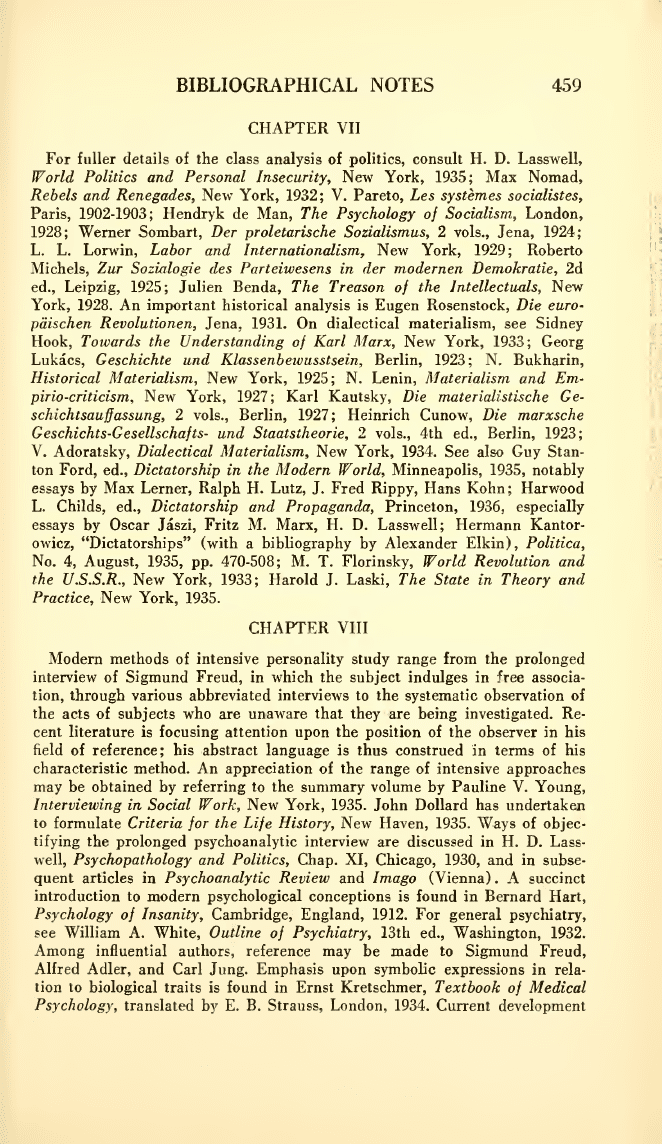
BIBLIOGRAPHICAL
NOTES
459
CHAPTER VII
For fuller
details
of the class analysis
of
politics, consult H. D. Lasswell,
World
Politics and Personal Insecurity,
New York,
1935;
Max Nomad,
Rebels and Renegades, New
York,
1932;
V.
Pareto,
Les systemes socialistes,
Paris, 1902-1903; Hendryk
de
Man,
The
Psychology
of
Socialism, London,
1928;
Werner Sombart, Der proletarische Sozialismus, 2 vols.,
Jena, 1924;
L. L. Lorwin,
Labor
and Internationalism, New York, 1929; Roberto
Michels, Zur
Sozialogie
des
Parteiwesens
in der
modernen Demokratie,
2d
ed.,
Leipzig,
1925;
Julien Benda, The Treason
of
the Intellectuals, New
York, 1928.
An
important historical
analysis is Eugen
Rosenstock,
Die
euro-
pdischen
Revolutionen,
Jena,
1931.
On
dialectical materialism,
see
Sidney
Hook, Towards
the Understanding
of
Karl
Marx, New York,
1933;
Georg
Lukacs, Geschichte und
Klassenbewusstsein,
Berlin,
1923;
N. Bukharin,
Historical Materialism,
New York,
1925;
N. Lenin,
Materialism
and
Em-
pirio-criticism. New
York,
1927;
Karl Kautsky, Die materialistische Ge-
schichtsauffassung,
2
vols.,
Berlin,
1927;
Heinrich
Cunow,
Die marxsche
Geschichts-Gesellschafts- und Staatstheorie, 2 vols., 4th
ed.,
Berlin,
1923;
V.
Adoratsky, Dialectical Materialism, New York, 1934.
See also Guy
Stan-
ton Ford, ed., Dictatorship
in
the Modern World, Minneapolis,
1935,
notably
essays
by
Max Lerner, Ralph
H.
Lutz,
J.
Fred Rippy,
Hans
Kohn; Harwood
L.
Childs,
ed..
Dictatorship
and Propaganda, Princeton,
1936,
especially
essays by Oscar Jaszi,
Fritz
M. Marx, H. D. Lasswell; Hermann Kantor-
owicz, "Dictatorships" (with
a
bibliography
by
Alexander
Elkin), Politica,
No.
4,
August,
1935,
pp.
470-508; M.
T.
Florinsky, World Revolution
and
the
U.S.S.R., New York,
1933;
Harold
J.
Laski, The State in Theory and
Practice,
New York,
1935.
CHAPTER
VIII
Modem methods
of
intensive personality study range from the prolonged
interview
of Sigmund Freud, in
which
the subject indulges in free associa-
tion, through various abbreviated interviews to the systematic observation
of
the acts
of subjects
who
are
unaware that they are being investigated.
Re-
cent
literature
is focusing attention upon the position of the
observer in
his
field
of
reference; his abstract
language is thus construed in terms of his
characteristic method.
An
appreciation
of the range of intensive approaches
may
be
obtained
by
referring to the summary volume
by
Pauline V.
Young,
Interviewing
in Social Work, New York, 1935.
John
Dollard has
undertaken
to formulate Criteria
for
the
Life
History,
New Haven, 1935. Ways of
objec-
tifying
the prolonged psychoanalytic interview
are discussed in H. D. Lass-
well, Psychopathology and
Politics,
Chap. XI,
Chicago,
1930,
and in subse-
quent
articles in
Psychoanalytic
Review and Imago (Vienna)
. A succinct
introduction to modern psychological conceptions
is found in Bernard Hart,
Psychology
of
Insanity, Cambridge, England,
1912.
For
general psychiatry,
see William
A.
White, Outline
of
Psychiatry,
13th
ed.,
Washington,
1932.
Among influential authors, reference may
be made to Sigmund
Freud,
Alfred Adler,
and Carl
Jung.
Emphasis upon symbolic expressions
in
rela-
tion to
biological traits
is found in
Ernst Kretschmer, Textbook
of
Medical
Psychology,
translated
by
E. B. Strauss, London, 1934. Current
development
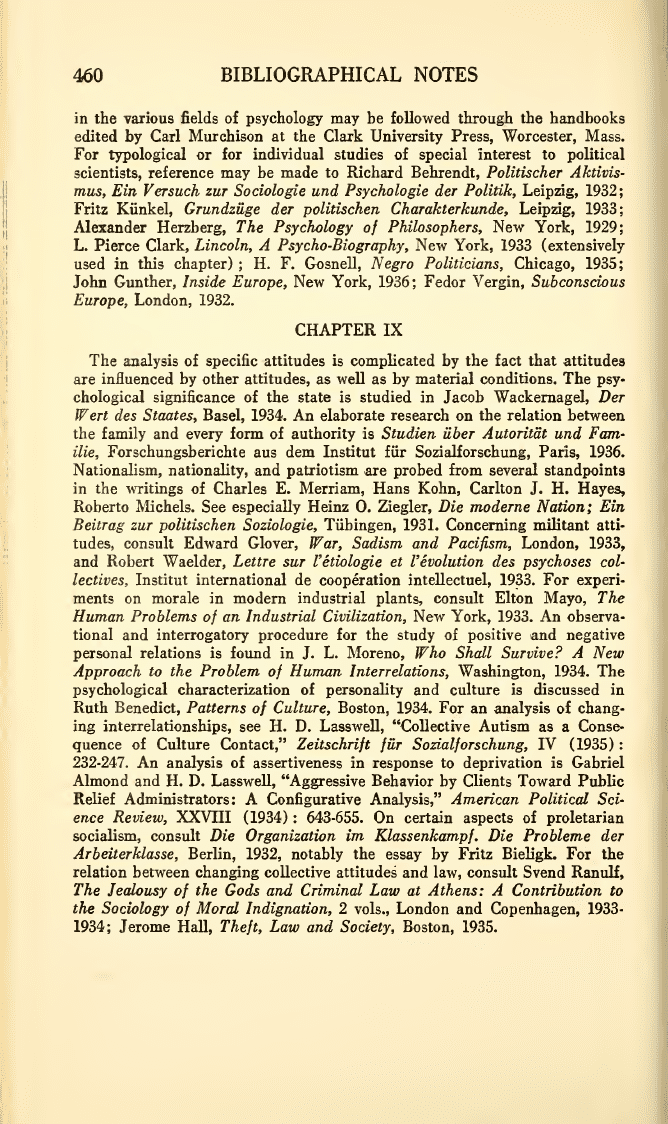
460
BIBLIOGRAPHICAL NOTES
in
the
various fields of psychology may
be
followed through the handbooks
edited
by
Carl
Murchison at
the
Clark University
Press,
Worcester, Mass.
For typological or for
individual
studies of special interest to political
scientists, reference may be
made to Richard Behrendt, Politischer Aktivis-
mus, Ein Versuch zur Sociologie und Psychologic der Politik, Leipzig,
1932;
Fritz Kiinkel,
Grundzuge
der politischen
Charakterkunde, Leipzig,
1933;
Alexander Herzberg,
The Psychology
of
Philosophers,
New
York, 1929;
L. Pierce
Clark,
Lincoln,
A
Psycho-Biography,
New
York,
1933 (extensively
used
in
this
chapter)
;
H. F.
Gosnell, Negro Politicians,
Chicago,
1935;
John
Gunther, Inside Europe,
New
York,
1936;
Fedor Vergin, Subconscious
Europe, London, 1932.
CHAPTER
IX
The analysis
of
specific attitudes is complicated by the fact that attitudes
are
influenced by other attitudes,
as
well as by material
conditions.
The
psy-
chological
significance of the
state
is
studied
in Jacob
Wackemagel,
Der
Wert
des
Staates, Basel, 1934.
An
elaborate research
on
the relation between
the family and every form of authority is Studien iiber
Autoritat
und Fam-
Hie,
Forschungsberichte
aus
dem
Listitut
fiir Sozialforschung, Paris, 1936.
Nationalism, nationality,
and
patriotism
are probed from
severjj
standpoints
in the writings
of Charles E.
Merriam, Hans Kohn, Carlton
J.
H. Hayes,
Roberto Michels.
See
especially Heinz
0.
Ziegler, Die moderne Nation; Ein
Beitrag
zur
politischen Soziologie,
Tiibingen, 1931. Concerning militant atti-
tudes, consult
Edward
Glover,
IFar,
Sadism
and
Pacifism,
London,
1933,
and
Robert Waelder, Lettre
sur
I'etiologie et revolution
des
psychoses
col-
lectives, Institut international
de
cooperation inteUectuel,
1933.
For experi-
ments on morale in modem industrial plants, consult Elton Mayo,
The
Human
Problems
of
an
Industrial Civilization, New
York, 1933. An observa-
tional and
interrogatory
procedure for the study of
positive
and
negative
personal
relations is
found in
J.
L.
Moreno,
fFho
Shall Survive?
A New
Approach to the Problem
of
Human Interrelations,
Washington, 1934. The
psychological characterization of personality
and
culture
is discussed in
Ruth Benedict, Patterns
of
Culture, Boston, 1934. For
an
analysis of
chang-
ing interrelationships,
see H. D. Lasswell, "Collective
Autism
as
a
Conse-
quence
of Culture
Contact," Zeitschrift
fiir
Sozialforschung, IV
(1935):
232-247.
An
analysis
of
assertiveness
in response to deprivation is Gabriel
Almond and
H. D.
LassweU, "Aggressive Behavior
by
Clients Toward
Public
Relief
Administrators:
A
Configurative Analysis," American Political Sci-
ence Review, XXVIII
(1934) :
643-655.
On certain aspects of proletarian
socialism, consult Die Organization im
Klassenkampf. Die Probleme der
Arbeiterklasse, Berlin,
1932,
notably the
essay
by Fritz Bieligk. For the
relation between changing collective attitudes
and law, consult Svend Ranulf,
The Jealousy
of
the Gods and Criminal Law at Athens:
A Contribution to
the Sociology
of
Moral
Indignation,
2 vols., London and
Copenhagen,
1933-
1934; Jerome HaU,
Theft,
Law
and
Society,
Boston, 1935.
